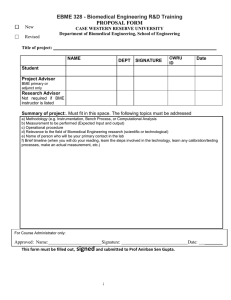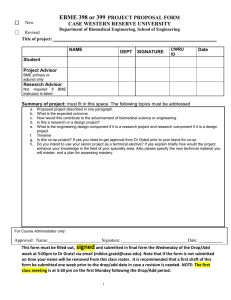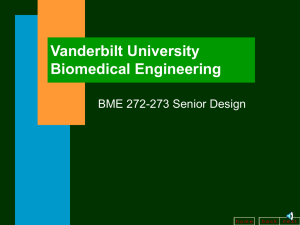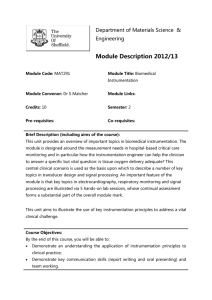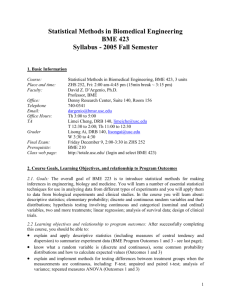BME-650: Biomedical Measurement and - www
advertisement
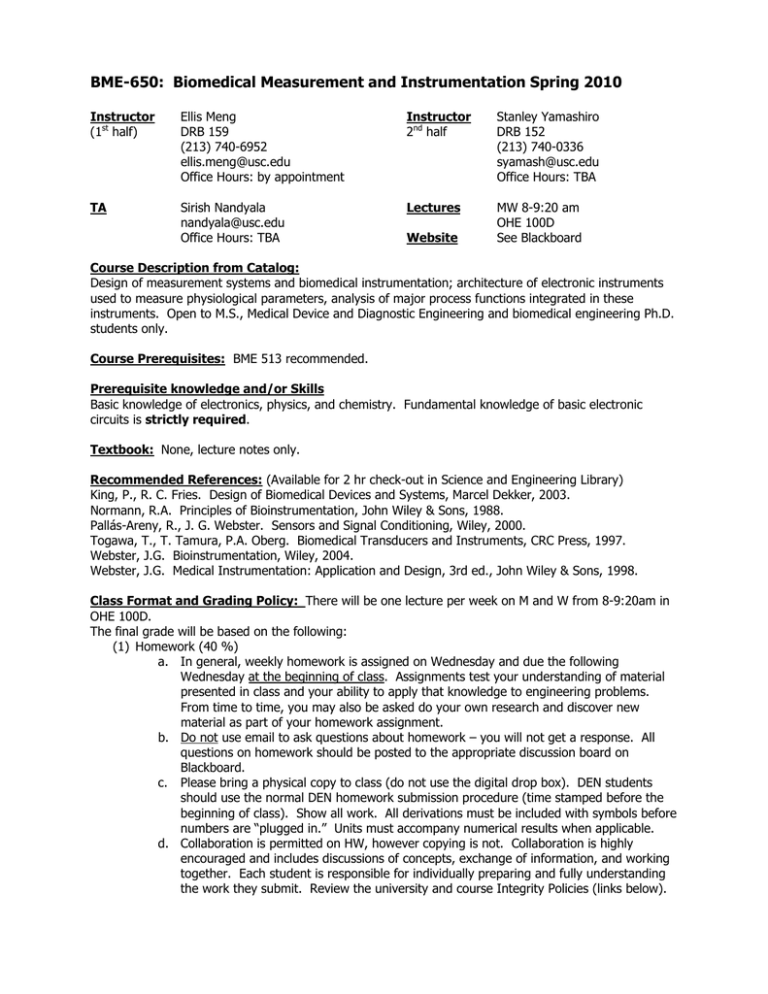
BME-650: Biomedical Measurement and Instrumentation Spring 2010 Instructor (1st half) Ellis Meng DRB 159 (213) 740-6952 ellis.meng@usc.edu Office Hours: by appointment Instructor 2nd half Stanley Yamashiro DRB 152 (213) 740-0336 syamash@usc.edu Office Hours: TBA TA Sirish Nandyala nandyala@usc.edu Office Hours: TBA Lectures MW 8-9:20 am OHE 100D See Blackboard Website Course Description from Catalog: Design of measurement systems and biomedical instrumentation; architecture of electronic instruments used to measure physiological parameters, analysis of major process functions integrated in these instruments. Open to M.S., Medical Device and Diagnostic Engineering and biomedical engineering Ph.D. students only. Course Prerequisites: BME 513 recommended. Prerequisite knowledge and/or Skills Basic knowledge of electronics, physics, and chemistry. Fundamental knowledge of basic electronic circuits is strictly required. Textbook: None, lecture notes only. Recommended References: (Available for 2 hr check-out in Science and Engineering Library) King, P., R. C. Fries. Design of Biomedical Devices and Systems, Marcel Dekker, 2003. Normann, R.A. Principles of Bioinstrumentation, John Wiley & Sons, 1988. Pallás-Areny, R., J. G. Webster. Sensors and Signal Conditioning, Wiley, 2000. Togawa, T., T. Tamura, P.A. Oberg. Biomedical Transducers and Instruments, CRC Press, 1997. Webster, J.G. Bioinstrumentation, Wiley, 2004. Webster, J.G. Medical Instrumentation: Application and Design, 3rd ed., John Wiley & Sons, 1998. Class Format and Grading Policy: There will be one lecture per week on M and W from 8-9:20am in OHE 100D. The final grade will be based on the following: (1) Homework (40 %) a. In general, weekly homework is assigned on Wednesday and due the following Wednesday at the beginning of class. Assignments test your understanding of material presented in class and your ability to apply that knowledge to engineering problems. From time to time, you may also be asked do your own research and discover new material as part of your homework assignment. b. Do not use email to ask questions about homework – you will not get a response. All questions on homework should be posted to the appropriate discussion board on Blackboard. c. Please bring a physical copy to class (do not use the digital drop box). DEN students should use the normal DEN homework submission procedure (time stamped before the beginning of class). Show all work. All derivations must be included with symbols before numbers are “plugged in.” Units must accompany numerical results when applicable. d. Collaboration is permitted on HW, however copying is not. Collaboration is highly encouraged and includes discussions of concepts, exchange of information, and working together. Each student is responsible for individually preparing and fully understanding the work they submit. Review the university and course Integrity Policies (links below). They will be strictly enforced. This class has a no-tolerance policy on academic integrity violations – copying is a form of cheating. e. Late homework is not accepted (only exception is a valid family or medical excuse). (2) Exam 1a + 1b (15% each part for a total of 30 %) (3) Exam 2 (30 %) Homework/Academic Integrity Policy Students are expected to do their own homework assignments and should completely understand everything that they submit as their own. It is anticipated and expected that students consult one another for clarification of concepts, advice, to compare the final numerical homework solution, etc. It is not acceptable to show someone else your written homework, even if it is easier than explaining a concept verbally. You may also use whatever materials you find on the web, in other texts, or other sources to assist in preparing your homework. However, you may not consult homework or exams from previous offerings of BME 650 (in any form). Also, copying homework prepared by another student and plagiarizing are strictly prohibited. Violations of this policy will result in an automatic F in the class and filing of an academic misconduct report to the Office of Student Conduct. All students are expected to adhere to the USC standards of Academic Integrity (http://www.usc.edu/studentaffairs/SJACS/docs/AcademicIntegrityOverview.pdf and http://www.usc.edu/studentaffairs/SJACS/docs/GradIntegrity.pdf). Statement for Students with Disabilities Any student requesting academic accommodations based on a disability is required to register with Disability Services and Programs (DSP) each semester. A letter of verification for approved accommodations can be obtained from DSP. Please be sure the letter is delivered to me (or to the TA) as early in the semester as possible. DSP is located in STU 301 and is open 8:30 a.m. – 5:00 p.m., Monday through Friday. The phone number for DSP is (213) 740-0776. Course Outline and Schedule (Tentative) Topics Covered Week 1 1/11,13/09 Week 2 1/20/09 Week 3 1/25,27/09 HW Out Course Introduction Characteristics of Measurement Systems Operational Amplifiers HW 1 Operational Amplifiers Instrumentation Amplifiers HW 2 HW 1 Signals and Noise Filters HW 3 HW 2 Week 4 2/1,3/09 Origin of Biopotentials Human Biopotentials Week 5 2/8,10/09 Exam 1a (2/8) Biopotential Electrodes HW 4 Week 6 2/17/09 Biopotential Electrodes Other Electrodes HW 5 Week 7 2/22,24/09 Other Electrodes Mechanical Transducers Week 8 3/1,3/09 Mechanical Transducers Course Evaluation Exam 1b (3/1) Week 9 3/8,10/09 Spring Break Week 10 3/22,24/09 Light and Spectrophotometry Week 11 3/29,31/09 Measurement of Liquid and Gas Flows Week 13 4/12,14/09 Week 14 4/19,21/09 Week 15 4/26,28/09 HW 3 HW 4 HW 5 Temperature Transducers 3/15,17/09 Week 12 4/5,7/09 HW Due HW 6 HW 7 HW 6 Pressure, Motion, and Force Measurement Analog Linearization HW 8 HW 7 Review of Digital Electronic Devices Interfacing to Computers Digital Signal Processing HW 9 HW 8 HW 10 HW 9 Safety in Bioinstrumentation Final Review Course Evaluation Exam 2, 11a-1p HW 10 Recommended Classes for Further Study in Medical Instrumentation BME 302L Medical Electronics BME 405L Senior Projects: Measurements and Instrumentation BME 425 Basics of Biomedical Imaging BME 523 Measurement and Processing of Biological Systems BME 525 Advanced Biomedical Imaging BME 620L Applied Electrophysiology AME 305 Mechanical Design AME 503 Advanced Mechanical Design

